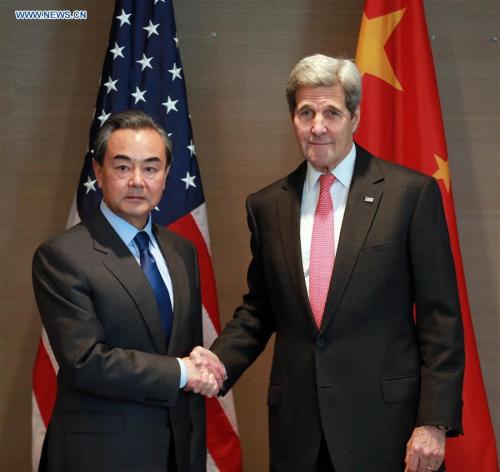MUNICH, Feb. 13 (Xinhua) -- Chinese Foreign Minister Wang Yi on Friday spoke out against the possible deployment of an advanced U.S. missile defence system in South Korea, stressing that it would complicate the regional stability situation.

MUNICH, Feb. 12, 2016 (Xinhua) -- Chinese Foreign Minister Wang Yi (L) meets with U.S. Secretary of State John Kerry in Munich, Germany, Feb. 12, 2016. (Xinhua/Luo Huanhuan)
Meeting with U.S. Secretary of State John Kerry on the sidelines of the Munich Security Conference, Wang made clear China's opposition to the possible deployment of the Terminal High Altitude Area Defence (THAAD) system in South Korea.
The United States and South Korea have begun negotiations on the deployment of THAAD. The Pentagon made the announcement hours after the Democratic People's Republic of Korea (DPRK) carried out on Sunday what it said was a satellite launch but others believed was a missile test.
Under UN Security Council resolutions, the DPRK is banned from test-firing any rockets based on ballistic missile technology.
As one of the most advanced missile defense systems in the world, THAAD can intercept and destroy ballistic missiles inside or just outside the atmosphere during their final phase of flight.
Despite claims by Washington and Seoul that the missile shield would be focused solely on the DPRK, it is widely believed that the deployment would pose considerable threat to neighboring countries.
In an interview with Reuters on the sidelines of the Munich meeting, Wang said that he was concerned by the possible deployment of the sophisticated anti-missile system in South Korea.
"The deployment of the THAAD system by the United States ... goes far beyond the defense needs of the Korean Peninsula and the coverage would mean it will reach deep into the Asian continent," Wang said.
"It directly affects the strategic security interests of China and other Asian countries," he added.
The Chinese foreign minister urged the U.S. side to act cautiously, not to undermine China's security interests or add new complications to regional peace and stability.
Regarding the DPRK's recent nuclear test and rocket launch, Wang said both moves violated UN resolutions and pose seriously challenge to the global non-proliferation regime.
China and the United States have agreed to speed up the consultation process at the UN Security Council to reach a new resolution and take strong and effective measures to deter further development of nuclear and missile programs by the DPRK, Wang noted in his meeting with Kerry.
Reiterating China's stance on sanctions against the DPRK, he said "it remains to be our common goal to work together and find a way to bring the Korean Peninsula nuclear issue back to the right track of dialogue and negotiations, which is fully in line with the interests of all parties, including China and the United States."
In the interview with Reuters, Wang said China insists that there should be no nuclear weapons on the peninsula, no matter whether they were possessed by the north or the south side, and no matter whether they were developed locally or introduced from the outside.
China, a neighboring country of the Korean Peninsula and a major stakeholder in regional stability, also maintains that the Korean Peninsula denuclearization should be achieved via dialogue, not war, and that China's national security interests should be guaranteed, he added.